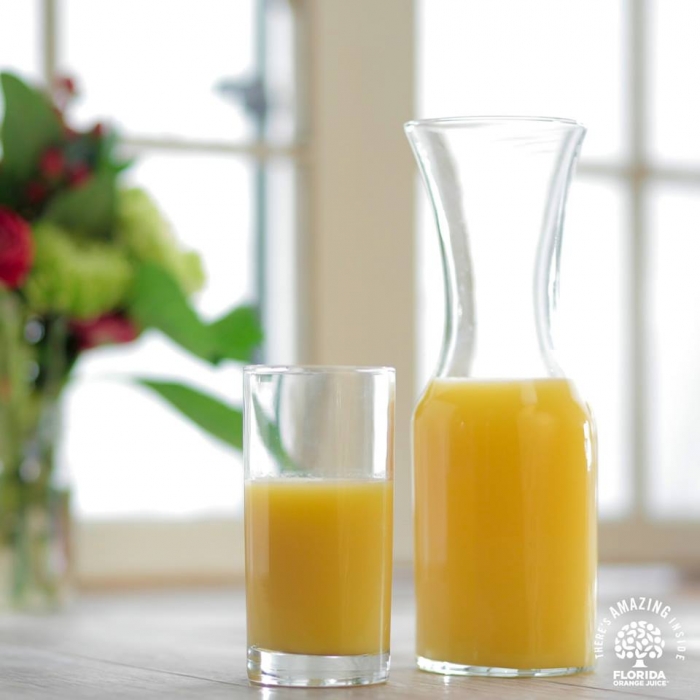100% Orange Juice can Still be a part of Healthy Diet!
Submitted by Brent on May 8, 2019 - 12:48am


The Short Answer is YES!
Did you know that only 1 in 10 Canadians are getting their recommended intake for fruits and vegetables per day?100% Florida Orange Juice can help reach your daily intake of fruit and vegetables. While it is true that whole fruits (and vegetables) will contribute more fiber than the juice itself, within a recommended portion controlled serving of 8 oz for adults and 4-6 oz for children each day, 100% juice can contribute an abundance of nutrients and aid in hydration, as we will discuss below.
Recently, as I am sure many Canadians are aware, Health Canada has had a major revision to the Food Guide to Healthy Eating. One of the most talked about is the guideline recommending that Canadians make water the main fluid/drink of choice. While this is sound advice, does it mean then that 100% fruit juice (not the kind with added sugar) is now “BAD” for us? Canada’s New Food Guide to Healthy Eating is based on credible scientific evidence which supports their recommendation for Canadians to reduce their overall daily sugar consumption. Recent dietary intake reports suggests that most Canadians are getting their added sugars from the beverage category and thus being a major contributor to the added (and overconsumption of) sugars in Canadian diets. But when we look more closely at the main beverage culprits, it is the specialty coffees/hot drinks and soft drinks which top the charts in added sugars in the Canadian Diet. And might we point out that these beverages provide little, if any other quality nutrients, making them calorie-dense and nutrient-poor.
So where does 100% juice fit in the Canadian Diet?
Consider fussy eaters/children who are challenged to EAT their fruits and vegetables, but will gladly take a 4 oz glass of 100% OJ at breakfast? Albeit a 4 oz glass (that from 1.7 fresh oranges) of juice does not look like much, hence the need to reinforce that if recommendations are kept within these serving size guidelines (as per the OLD Food Guide), the contributing (natural) sugar coming from 100% juice is very minimal. What should be reinforced is that if consumers could stick to this recommended serving size and not super-size their 100% juice serving, then they would be well within their total daily sugar requirements, including other carbohydrates/sugars sources such as that from whole grains, whole fruits, vegetables, dairy and beans, peas, lentils etc.
Consideration should also be given to seniors who are challenged daily to get enough overall fluids in, due to their decreased thirst sensation and drive to drink. By adding a splash of 100% juice to plain water can greatly increase the flavor profile of perceived “taste-less”/plain water Some elderly may even benefit from the extra nutrients and energy that a 4oz glass of 100% Juice can supply as a means to help meet their overall challenging energy requirements when situations of decreased appetites exist.
Also consider those participating in continuous bouts of exercise/activity/sports outside in the heat for over 1.5 hours! Plain water as a rehydrator and as a refueller will not cut it. Instead try making your own homemade sports drink with half 100% juice and half coconut water and a pinch of salt! This will provide the right amount of carbohydrate for re-topping the tank and give the perfect mix of electrolytes to help the body rapidly absorb the fluid and prevent dehydration. Considering young athletes, who have a decreased thirst sensation as well, the flavor profile of the juice hydrator as compared to that of plain water may entice them to drink!
ADDED VS. NATURAL VS. FREE SUGARS
Let’s first get on the same page of what exactly is in 100% juice and the difference between Added Sugars, Natural Sugars and FREE Sugars
In order to call a fruit juice ‘100% real fruit juice’ in Canada, it must contain juice that is squeezed from the fruit and is allowed to have certain added vitamins and minerals added to it.1 Any juice product that contains less than 25% fruit juice is not allowed to even have the word ‘juice’ in its name on the label.2Fruit juice product labeling is highly regulated in Canada, which helps Canadians navigate the market and choose the healthiest product they can.
100% Orange Juice Nutrition RE-VISITED!
If you are still debating on whether or not to drink 100% juice, let’s take a closer look at the nutrition and tasty health benefits of 100% orange juice as you reach for your next glass:
A 4oz glass of 100% OJ (no pulp) provides:
- 65 calories and never contains added sugar
- at least 60% of your daily value for vitamin C
- a good source of Potassium – For a healthy body fluid balance
AND can include a variety of added nutrients:
- Vitamin D & Calcium – For bone health
- Vitamin E – Antioxidant for improved immune health
- Folic Acid, Riboflavin, thiamin – For healthy cell growth and development
- Niacin – For digestive system, skin and nerves
- Zinc – For a healthy immune system
- Vitamin A – For eye health
…and last but not least….Most recently 100% OJ has found that it also provides hesperidin, a polyphenol that may have positive effects on heart and vascular health, blood sugar control and aiding the immune system.
BOTTOM LINE:
We aren’t saying to replace all of your whole fruits and vegetables with juice. Moreover, juice can act as another means to meet your recommended nutrient intakes. Enjoy an 8 oz serving of 100% orange juice a day or combine it in various recipes to reap the amazing nutrients inside which promote good cardiovascular, immune and cognitive health among many more!
Fun Recipes from Florida Citrus!
Floridacitrus.org is loaded with health and nutrition information and updated with the latest scientific research on the benefits of 100% OJ. It also has some great tips and recipes on how to include your 8oz of OJ in your daily diet! Try some new Spring recipes such as the Heart Healthy Bulgur Bowl:
https://www.floridacitrus.org/oj/recipes/heart-healthy-bulgur-grain-bowl/
References:
- https://www.canadianbeverage.ca/beverages/juices/
- http://www.inspection.gc.ca/food/requirements-and-guidance/labelling-standards-of-identity-and-grades/for-industry/processed-fruit-or-vegetable-products/juice-and-juice-products/eng/1348153076023/1348153220895
Written By:
Angela Dufour, MEd, RD, CSSD, IOC Dip Sports Nutr, ISAK 2
Lead Performance Dietitian for the Canadian Olympic Committee
Owner, Nutrition in Action, Halifax, NS


